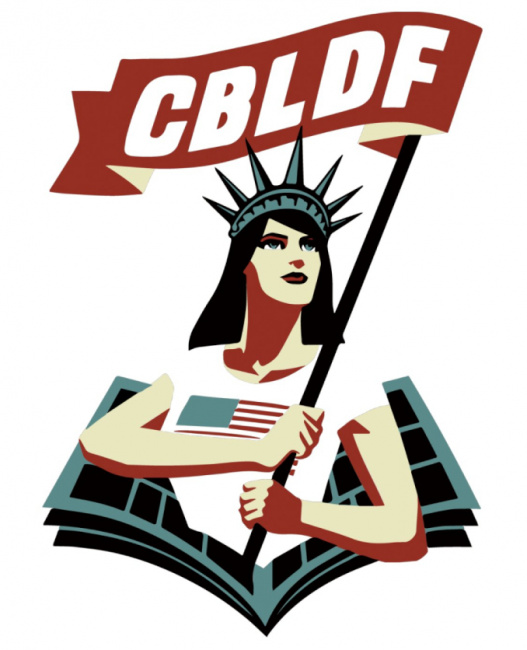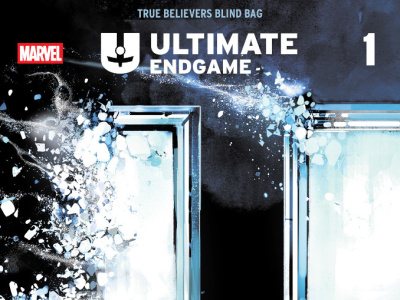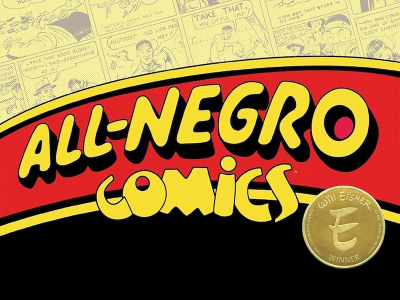For ICv2 Kids Week, we reached out to Comic Book Legal Defense Fund Interim Director Jeff Trexler on the environment for kids graphic novels in the wake of events over the past year, and learned, "The people on the other side, they are playing for keeps."
ICv2: Let's start out with big picture and then we'll drill down into our core interest, which is what's going on in stores. People have probably been reading about the growing activism of some groups to try to limit what students can be taught in schools or read in their libraries. Can you talk a little bit about that general environment?
Jeff Trexler: We had reached a point in time when I first came on board where you can say that challenges to comics had hit a predictable level; there would be an occasional challenge here and there. The retail environment had changed significantly in that we hadn't had a retailer arrested or threatened with arrest for a while. Then, we started getting a few incidents that seemed interesting in terms of their tone and in terms of their focus.
The one for me that crystallized everything was a challenge in Leander, Texas [last summer] where we saw two things going on. One is there were challenges to certain content, certain books, and you could see that there were trends developing about the types of books that were being challenged, largely LGBTQ content, and you could see some things from the critical race theory stuff was percolating, and graphic novels that were previously seen as safe were beginning to be challenged.
That's one angle. The other angle is censorship as a medium. That's where it gets particularly interesting for comics because, in Leander, I saw an argument that I hadn't seen for a while, which was an argument that by teaching people graphic novels, you were having kids read below grade level, that graphic novels were inherently sub‑literate.
The argument was made in Leander that you're not getting kids up to grade. You're not teaching literacy. Literacy is text. It's not pictures. If you're spending school time on pictures, you're not doing them a service educationally.
An additional argument on top of that was that there was a problem with images themselves because comics were more lurid. They were more traumatic. They could create a response in kids that went beyond text.
You had this interesting phenomenon in Leander that ended up culminating in two books being removed where graphic novel adaptations were challenged but the text‑based books survived the challenge or weren't challenged at all. In Leander, you have The Handmaid's Tale graphic adaptation was knocked down, which we just saw again in Oregon this past week. They also had the adaptation of the short story The Lottery, by Shirley Jackson, that was removed as well, even though the text‑based version was kept. You've seen some other things around the country for getting rid of graphic novel versions, say, The Diary of Anne Frank, another book that's commonly challenged now in graphic novel form but not in text.
It was a sign that something was happening.
A big thing happened that September when Leander became an example for what was going on in Virginia. Virginia was having an election as you may have heard, with now‑Governor Youngkin. It was anticipated he would lose.
Something happened in Virginia where one of the parents was watching school board meetings and stuff that was going on in Leander and noticed that you could talk at school board meetings. These school board meetings were being posted on YouTube. They were beginning to get a bit of a response. They also noticed that there was something about the visual medium that the folks in Leander, the people that had challenged, had been taking advantage of, that is the visual medium.
In a one‑two punch, there was an article on graphic novels that were being allowed in schools (Gender Queer was probably the most prominent) that talked about "obscene" works that were being taught in schools.
There's this parent in Virginia who says, "Wait a second. We could put one and one together and get two. We take YouTube format. We can take the visual format out of these books and display the visuals at a school board meeting and then post the visuals on Twitter, and Instagram, and whatever social media you want to use."
That's what happened. The person goes to the school board meeting with images from Gender Queer and says, "This is the pornography that your children are reading in schools." These images then go viral on Twitter. All of a sudden, we start seeing Gender Queer being challenged around the country (see "’Gender Queer’ Was the Most Frequently Challenged Book in 2021").
Other books that had been challenged sporadically are also caught up in this like Drama by Raina Telgemeier. Then we start seeing this around the country. It's often portrayed as, this is just Texas, this is Virginia, this is Alabama, this is Florida. No. I live in New York. Across the border just a few miles down from where I live, there's a town called Brookfield, Connecticut. Drama had been challenged in Brookfield, Connecticut.
A few miles in the other direction from where I live there were books as topic of discussion in a place called Carmel School District. It's all over, Staten Island, Long Island. Even in Manhattan, there are challenges being made. In California, we've heard challenges to New Kid and Class Act.
We've seen it nationwide. We've also seen retailers being challenged. Part of it is for content, part of it is for literacy.
Let's take it over to retailers. Just looking at the broad numbers, one of the things we've been observing is that these titles that are being challenged in libraries and schools are selling better at trade than they were before. We saw Maus in Walmart (see "Channel Check: Walmart SuperCenter"). We've never seen Maus in Walmart before in the 30, 40 years since it's been published. Gender Queer has been hitting the NPD bestseller charts, which it definitely was not before (see "November 2021 NPD BookScan"). There's more demand, but that exposes retailers to risks that the same parents that are objecting to that content in schools object to their kids bring it home from stores. What are you seeing in that area?
What we're seeing is two things. One is I mentioned the description of these types of books as pornography. There is a particular aspect of law that had settled into a certain type of use that wasn't all that threatening to most people selling comics. This has to do with the laws regarding the distribution of material harmful to minors.
Traditionally, material harmful for minors in the past 20, 30, 40 years has been applied in a pedophilia case where somebody who's trying to have sex with a child will often give them sexually suggestive material in order to make them more conducive to engage in sexual acts.
Now, what we're seeing is jurisdictions using that statute in and of itself and saying, "Well, this material may have socially redeeming value as to adults and may be literary and artistic as to adults, but in our state, age of consent is under 18 and therefore anything that has to do with sexuality for a kid under 18, given that, is inherently obscene."
That concept's been around for a long time, hasn't it?
You see that argument several decades ago in terms of comics, and that sort of thing in the 40s, or 50s. After losing a number of rounds in the obscenity wars, people stopped using that argument. It just wasn't all that viable an argument. I'm not even sure if it would win if they tried it today.
What people realized (and I think this is where social media has helped people understand) is you don't have to win an argument. You don't have to go into something knowing that you could win the argument. You just have to apply enough pressure on people selling or giving away the material that you don't want them to sell or give away.
The pressure that's been applied is for the seller, for the sale of the books with same‑sex material that a kid under the age of 18 or 16 or whatever the age is in the state, gets their hands on that material. Then you are arguing with, if you make this material available to children, we're going to arrest you because this is obscene as to minors. This is harmful to minors.
What you're dealing with are situations where retailers are now getting pressure from local law enforcement to stop selling certain books or they will be arrested, prosecuted, thrown into prison.
What retailers are facing is do we keep distributing these books, or do we pull them off the shelves? There are instances where the decisions being made to just pull these books off the shelves because they don't want to risk that kind of thing.
Did any of these cases involving retailers get as far as charges, or they were just intimidation?
At this point, it's intimidation.
Intimidation by law enforcement?
Law enforcement, legislators, and activists.
If that happens to a retailer, either somebody coming in across the counter and saying, "Why are you carrying this book? This is obscene," or being visited by law enforcement or being called out by a politician, what should they do?
One of the first things they should do if they are being challenged is talk to their lawyer and reach out to us, because what you want to do is have somebody who's going to be able to look at the law in your particular state so you can understand what your exposure is.
We can talk to them about both the legal status with respect to harmful to minors laws in their state. We can talk about the specific works in question, and whether they would even fall into the ambit of those laws.
We could also talk about how to strategize, how to deal with this particular situation. And this is equally important, we could also work with local counsel to speak with law enforcement, whether the local police or the local district attorney's office.
One of the things that is incredibly important to remember if you're dealing with a case such as this is that you're facing a question; you're facing a choice. Do you want to fight or do you want to win? There's a natural temptation in these kinds of circumstances to immediately take something public and to fight, fight, fight, fight, fight. And there's a time for that, there's definitely a time for going public.
It’s also possible that with a few phone calls with local counsel, and counsel in consultation with us (or if you want us to be part of it, to be a part of a conversation with local law enforcement), to have this whole thing resolved with some carefully stated collegial explanations as to why the material in question is legal and that any attempt to prosecute on this would not survive, or probably end up having a local DA's office and local police looking bad and it could possibly result in some kind of countersuit. There are ways to have those conversations that can protect a retailer, and can keep it from becoming a social media scandal, or keep it from becoming something that gets into the zone of somebody being arrested.
Again, I strongly advise they talk to local counsel and reach out to us for additional assistance. That's going to be the first step because the people on the other side, they are playing for keeps.
CBLDF is obviously a very important resource to schools, libraries, retailers. Over the last couple of years, it's been a lot less visible. Fundraising was probably constrained by COVID. What is the financial situation at CBLDF? Is it a strong organization that's going to be around to fight this fight?
One of the first things I did after becoming a temp director was I put a moratorium on fundraising. We had people renewing their memberships, which is wonderful. I was really pleased with the fact that although we've had a few people drop off, most people have stayed with us as members. When we've been more visible in terms of talking about challenges at schools and that sort of thing, people have been sending us gifts as well. It's been tremendous, I’m tremendously appreciative of that. I wanted to move us more towards s hybrid model, where there will continue to be certain types of things being sold, there will be donations from members, but also, I am moving us more into building in grants support as well to have special projects that we're involved in that will be funded by charities and others. That's in process as we speak.
Will it be around for a long time if I have anything to do with it in terms of the remainder of my time here? Yeah, I want to put us on a more stable diversified fundraising model.
Another thing I did soon after coming in was I cut a lot of costs in terms of where the organization was spending money. We've been able to be maintaining our reserves, which is fantastic. Our fundraising initiatives are starting to resume, more about that soon. The grant thing has already started in terms of outreach for grants.
I'm very positive that we'll be around for a long, long time.
Click here for more ICv2 Kids Week articles on kids comics and graphic novels!

'The people on the other side, they are playing for keeps.'
Posted by Milton Griepp on April 29, 2022 @ 3:01 am CT
MORE COMICS
For 'Ultimate Endgame' #1
August 20, 2025
Marvel Comics has revealed that it will use a blind bag program to promote the first issue of Ultimate Endgame, the five-issue event series.
As Eventful Hearing Continues for Third Day Wednesday
August 20, 2025
Image Comics has reached a settlement in its dispute over consignment inventory, and an eventful hearing continues for a third day.
MORE NEWS
'Books Are a Mess'
August 20, 2025
Diamond Comic Distributors is in danger of administrative insolvency, and its records are in disarray, according to statements in a court hearing.
Remastered Paperback Edition of Eisner Winner with New Content
August 19, 2025
The digitally remastered edition of the Eisner-winner includes new content.








